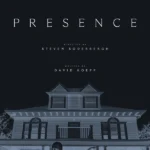When visionary architect László Toth and his wife Erzsébet flee post-war Europe in 1947 to rebuild their legacy and witness the birth of modern America, their lives are changed forever by a mysterious and wealthy client.
Chuck says:
Brady Corbet’s “The Brutalist” is an anomaly in the current cinematic landscape. An emotional epic, it traces the course of one man’s efforts to rediscover his identity and place in society, taking its time to consider myriad aspects of his resurrection. Deliberately paced, the film runs well over three hours but never lags, as our investment in its complex, damaged protagonist, Laszlo Toth, is complete from the start. Thanks to Mona Fastvold and Corbet’s script, as well as towering performances from its three principals, the film is an emotionally immersive experience. It embraces its examination of how the effect of trauma manifests itself in its victims’ lives and work as well as the power of healing through art.
Brody and cinematographer Lol Crawley put us in Toth’s shoes (Adrien Brody) from the start, the film’s first shot a disoriented view of the Statute of Liberty as he emerges from the bowels of the steamer that’s brought him and other World War II refugees to the United States. The statute seen from an oblique angle suggests the freedom they seek will not come without difficulty. This is certainly the case for Toth, as he finds himself at loose ends after his cousin Attila (Alessandro Nivola), who helped with his passage and invited him in his home, capitulates to his wife’s desire that he leave.
However, before this occurs, Attila, who owns a furniture store, gives Laszlo a commission to redesign the library of industrialist Harrison Lee Van Buren (Guy Pearce). The result is not to the owner’s liking and soon the architect finds himself taking odd jobs to survive. Yet, Van Buren has a change of heart when outsiders compliment the room’s radical, striking design, which is eventually the focus of a “Look” magazine feature story. Realizing his mistake, he tracks down Toth, provides him with a home and promises to help rescue his wife Erzsebet (Felicity Jones) and niece Zsofia (Raffey Cassidy) from a Hungarian refugee camp. Perhaps most importantly, he gives him a commission to build a community center, a building he hopes will help resurrect his career.
As the story plays out, we see Toth grapple with his past, the turmoil he suffered informing his decisions. Substance abuse to dull the pain as well as acts of self-destruction plague him. However, in many ways, it’s his hubris that’s his biggest hurdle, as the eternal conflict between commerce and art comes to divide him and Van Buren. Cost overruns and other unforeseen difficulties force the industrialist to scale back the project, a move Toth takes as a personal affront.
Yet, there’s more than ego at stake. Having built a reputation in pre-war Europe, Toth’s building of the community center is not simply the first step towards reestablishing himself, but an act of healing. The building is a reflection of where he’s been as well as where he is going and to change it would impede his progress. When the project is in danger of being cancelled, Toth knows this would be a negation of himself, a blow to his psychic he may never recover from and desperately fights to avoid.
At its core, the film is a character study but that doesn’t prevent Brody from also including a broadside aimed at the wealthy. Despite his seeming generosity towards Toth, Van Buren ultimately reveals himself to be just another opportunist willing to take advantage of the disadvantaged. Toth’s desperate need for resurrection leaves him vulnerable, a situation the industrialist comes to exploit in every way possible, leaving the architect shattered.
Much praise, including Academy Award nominations, have been showered upon the three principals, all of it deserved. Jones is allowed to show a depth her previous roles have lacked. Though her entrance in the film comes late, she makes her presence known, a force to be reckoned with despite her diminutive size. Jones never allows us to forget Erzsebet’s pain beneath her steely appearance. Pearce is equally effective, he too getting the sort of complex role that has evaded him. Though his character initially seems benevolent, there’s a cold glint in his eye throughout revealing his icy soul.
As for Brody, the passion and pain he brings to Toth is the linchpin of the movie. He hasn’t had a role this complex since “The Pianist” and makes the most of the opportunity. The wounded, desperate quality he imbues Toth with is transformative, the actor disappearing into the role to powerful, poignant effect.
A towering achievement, “The Brutalist” is a film that will yield additional insights with multiple viewings. The power in its message of healing and reconciliation is only achieved due its dense, complex nature. For those craving rewarding, challenging cinema, Brody’s work fits the bill.
4 Stars




